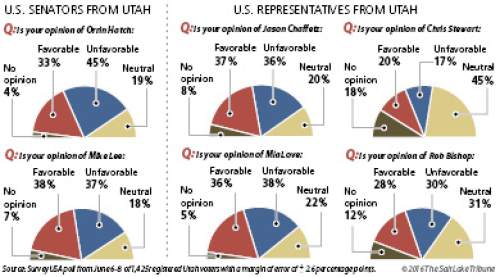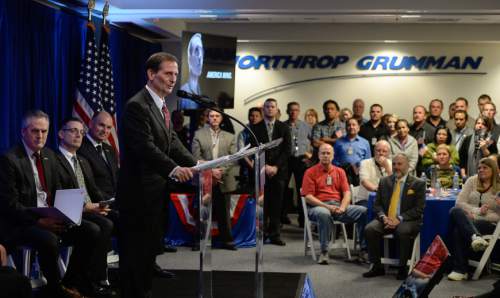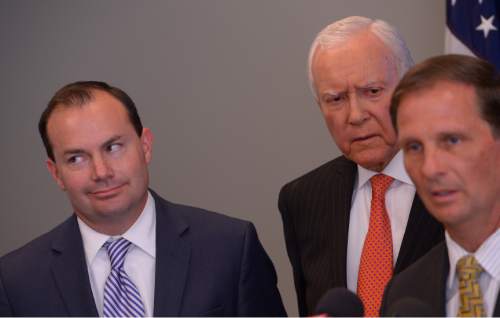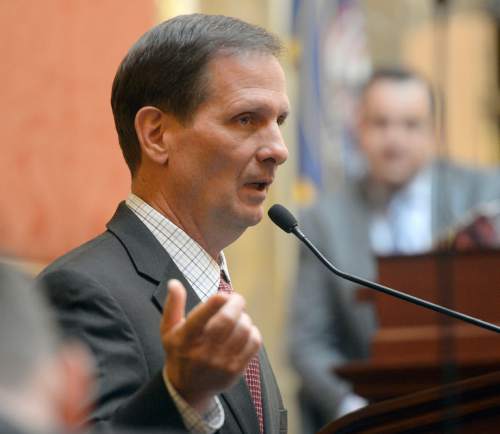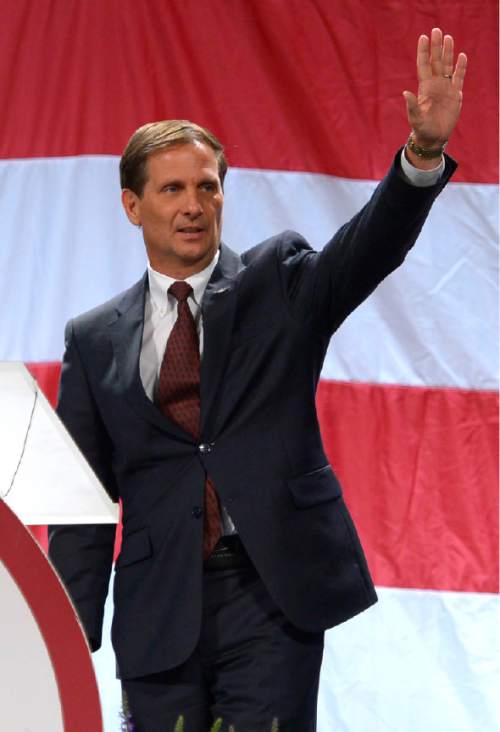This is an archived article that was published on sltrib.com in 2016, and information in the article may be outdated. It is provided only for personal research purposes and may not be reprinted.
Washington • Can you name the U.S. House member who represents Salt Lake City? Or St. George? How about the one who represents Bountiful or Farmington?
In each case, the answer is Chris Stewart, a former U.S. Air Force officer and author who is seeking his third term this November, but don't be too hard on yourself if you were stumped. He's by far the state's least-known member of Congress, often overshadowed in a delegation loaded with committee chairmen and nationally prominent politicians.
"It is just kind of the reality we deal with," he said in a recent interview in his House office. "I realize I may not be the face of Utah politics."
Nearly two-thirds of Utahns are not familiar enough with Stewart to say whether they like the job he is doing or not, according to a new poll commissioned by The Salt Lake Tribune and the Hinckley Institute of Politics.
Conducted by SurveyUSA in early June, the poll found 20 percent of respondents had a favorable view of Stewart and 17 percent had an unfavorable view. Beyond that, 45 percent said they had a neutral view and 18 percent said they had no opinion of the congressman.
Conducted statewide, the Tribune-Hinckley poll asked the same question for each member of Utah's congressional delegation. Next to Stewart, the least-known federal officeholder was seven-term Republican Rep. Rob Bishop, who represents northern Utah, and even in his case 58 percent of respondents either had a favorable (28 percent) or unfavorable (30 percent) opinion.
Not surprisingly, Stewart was best known in the 2nd Congressional District, which he represents, but even here fewer than half those polled gave a clear opinion of his performance, with 40 percent of respondents saying they were neutral toward him and 11 percent said they had no opinion.
"It means he has a great opportunity in the state of Utah to make sure he tells his story well," said Jason Perry, director of the Hinckley Institute at the University of Utah, who notes that Stewart's understated persona is unusual in politics.
"At events, he comes in and is personable, but he doesn't spend a lot of time trying to grab the spotlight from anyone," added Perry.
Beyond his more reserved personality, there are a few major reasons why Stewart isn't as prominent as his colleagues. He's the only member of the delegation who had not either previously held public office or worked in government before he entered a crowded Republican field in 2012, winning the nomination at the state GOP convention.
And in such a conservative district — the liberal bastion of Salt Lake City is an island in an otherwise Republican dominated sea — his two elections haven't been close. He received 62 percent of the vote in 2012 and 61 percent in 2014.
In both of those years, Mia Love's close campaigns in the 4th Congressional District (she first lost to then-Rep. Jim Matheson before beating Doug Owens) sucked up nearly all of the attention, to the point that in that first race, Stewart struggled to convince voters that he was the GOP candidate in the 2nd District, not Love.
If people did know him, it was likely from his books. He's written "The Great and Terrible," a series of techno-thrillers, and religious books, such as "Seven Miracles That Saved America." But even then, Stewart knows his reach is somewhat limited to fans. "If someone doesn't like your books," he noted, "they just don't read them."
While not a natural attention seeker, Stewart has tried to raise his profile. He holds more town-hall meetings than anyone in the delegation, with eight scheduled during the House's regular August break.
And he recently promoted a 90-second Facebook ad that seeks to introduce himself to the 2nd District, an unusual move for someone who has won two elections handily. It ends with the congressman saying: "I am Chris Stewart. I'm a man of faith, a family man and I love my country. And I represent you."
Stewart said the ad was geared more toward people who "don't live and breathe politics."
"I think they recognize my name, but many don't know much about me," he said.
His House committee assignments haven't helped in that regard.
He's a member of the Intelligence Committee, which holds mostly closed-door sessions on terrorism and national security, and he's a member of the Appropriations Committee, which helps guide the budget. While important and respected posts, neither committee is high profile.
He's had more than a dozen national television appearances because of his role on the Intelligence Committee, often to discuss the war in Afghanistan or the fight against the Islamic State terrorist group.
"I kind of found my voice in national security," Stewart said.
He's used this post to criticize Democrat Hillary Clinton's use of a private email server when she served as secretary of state, suggesting that if he did what she had done when he served in the Air Force, he'd fear being indicted. And he's argued the limited U.S. military involvement in Afghanistan may lead to a failed state.
He's been less vocal about his role on Appropriations, where he has a hand in funneling money to some projects and away from others. He said he helped block labor rules about wages and overtime from applying to seasonal recreation workers, who are often paid per trip instead of per hour (a move with impacts for outdoor recreational businesses near Utah's national parks and monuments).
And he used the budget in an attempt to block the government from listing the sage grouse as an endangered species.
In the GOP presidential contest, Stewart played a leading role in promoting Florida Sen. Marco Rubio in Utah and caused a bit of a stir by suggesting that Donald Trump was "our Mussolini," referencing the famous 20th-century fascist leader of Italy.
Stewart has since said he was referring only to Trump's early comments urging the United States to kill the families of suspected terrorists and supporting torture.
While not a fan of Trump, Stewart has said he'd vote for the presumptive Republican nominee "because the alternative is just so unacceptable to us." He has no intention of going to the Republican National Convention next month.
In his own re-election bid, Stewart faces Democrat Charlene Albarran, a first-time candidate who moved into the district after launching her campaign. She has spent considerable time in Mexico, working with her husband on business and charitable endeavors.
Albarran speaks Spanish and has produced TV ads for the state's Spanish-speaking stations. She has promised to run a more aggressive race than Stewart's previous challengers, but unless the contest turns out to be a lot closer than it's expected to be, the 2nd District race likely won't get much attention.
Stewart may well win a third term and retain the title as Utah's least-known congressman.


